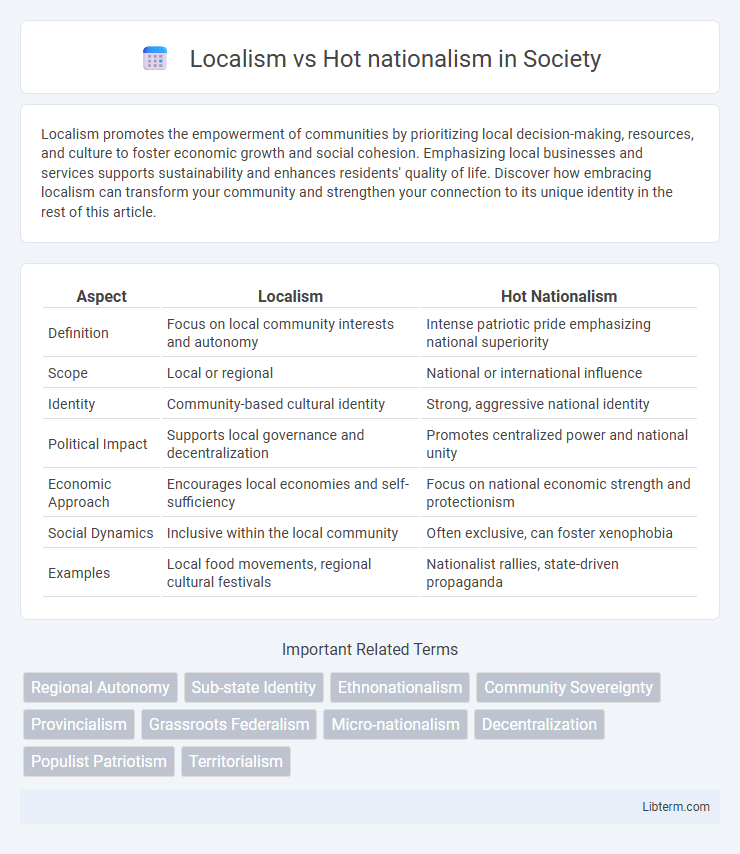Localism promotes the empowerment of communities by prioritizing local decision-making, resources, and culture to foster economic growth and social cohesion. Emphasizing local businesses and services supports sustainability and enhances residents' quality of life. Discover how embracing localism can transform your community and strengthen your connection to its unique identity in the rest of this article.
Table of Comparison
| Aspect | Localism | Hot Nationalism |
|---|---|---|
| Definition | Focus on local community interests and autonomy | Intense patriotic pride emphasizing national superiority |
| Scope | Local or regional | National or international influence |
| Identity | Community-based cultural identity | Strong, aggressive national identity |
| Political Impact | Supports local governance and decentralization | Promotes centralized power and national unity |
| Economic Approach | Encourages local economies and self-sufficiency | Focus on national economic strength and protectionism |
| Social Dynamics | Inclusive within the local community | Often exclusive, can foster xenophobia |
| Examples | Local food movements, regional cultural festivals | Nationalist rallies, state-driven propaganda |
Understanding Localism: Principles and Values
Localism emphasizes community-based decision-making, prioritizing local cultures, economies, and environmental stewardship over centralized or global systems. It values self-sufficiency, grassroots participation, and preservation of regional identity through practices like supporting local businesses and sustainable agriculture. This philosophy fosters resilience and social cohesion by empowering communities to address their unique needs and challenges directly.
Defining Hot Nationalism: Core Characteristics
Hot nationalism is characterized by intense emotional patriotism, aggressive defense of national sovereignty, and prioritization of national identity over global cooperation. It often manifests through populist rhetoric, exclusionary policies, and a strong emphasis on cultural homogeneity. This form of nationalism contrasts sharply with localism by amplifying national pride and central government authority instead of prioritizing regional autonomy and local governance.
Historical Context: Roots of Localism and Nationalism
Localism traces back to ancient communal societies emphasizing local governance and cultural identity, often emerging from agrarian economies where self-sufficiency was paramount. Nationalism, particularly its modern form, rose in the 18th and 19th centuries during the Enlightenment and the subsequent formation of nation-states, promoting unification based on shared language, history, and political sovereignty. These historical contexts reveal localism as deeply rooted in immediate community bonds, while nationalism arises from broader ideological movements seeking centralized statehood and collective national identity.
Key Differences: Localism Versus Hot Nationalism
Localism emphasizes prioritizing community interests, cultural preservation, and local governance, often advocating for decentralized power and economic self-sufficiency. Hot nationalism centers on intense national pride, strong centralized authority, and aggressive promotion of national identity, sometimes leading to exclusionary or expansionist policies. The key difference lies in localism's focus on empowering local communities and grassroots identity, while hot nationalism reflects a fervent allegiance to the nation-state and its dominance.
Social Impacts: Community vs Collective Identity
Localism nurtures strong community ties by promoting neighborhood-level engagement and prioritizing local traditions, enhancing social cohesion within smaller groups. Hot nationalism, driven by intense collective identity, fosters a powerful sense of belonging and unity across a broader population, often reinforcing national pride and common purpose. The social impact of localism centers on personalized relationships and grassroots participation, whereas hot nationalism emphasizes collective solidarity and large-scale social mobilization.
Political Implications: Governance and Decision-Making
Localism emphasizes decentralized governance, promoting community-based decision-making and increased political participation at the grassroots level. Hot nationalism often drives centralized authority, prioritizing national unity and top-down control to reinforce state sovereignty and identity. These contrasting approaches influence policy-making dynamics, with localism fostering diverse, localized solutions and hot nationalism enforcing uniform national agendas.
Economic Perspectives: Local Economies vs National Interests
Localism emphasizes strengthening local economies by promoting small businesses, local production, and community-based resource management, which can enhance economic resilience and reduce dependency on external markets. Hot nationalism prioritizes national interests, often focusing on large-scale industrial policies, protectionism, and the consolidation of economic power to achieve national economic sovereignty and competitive advantage in global markets. The tension between localism and hot nationalism lies in balancing decentralized economic empowerment with centralized national economic strategies for sustainable growth.
Cultural Narratives: Preservation and Identity Formation
Localism emphasizes preserving regional customs and dialects as vital elements of cultural identity, fostering a strong sense of community rooted in tradition. Hot nationalism aggressively promotes unified national narratives that often prioritize dominant historical interpretations and symbols, shaping identity through state-centered myths. Both approaches influence identity formation differently: localism nurtures diverse, grassroots heritage, while hot nationalism seeks homogenized cultural cohesion across populations.
Case Studies: Localism and Hot Nationalism in Action
Localism emphasizes community-driven governance and cultural preservation, exemplified by Catalonia's push for independence, highlighting economic self-reliance and regional identity. Hot nationalism, characterized by intense patriotism and often exclusionary policies, is evident in Hungary's Fidesz party promoting ethnic nationalism to consolidate political power. Both case studies reveal how localism and hot nationalism shape socio-political landscapes through divergent approaches to identity and autonomy.
Future Outlook: Balancing Local and National Priorities
Future outlook on Localism vs Hot Nationalism emphasizes integrating local autonomy with national cohesion to ensure sustainable governance. Prioritizing policies that address regional needs while supporting overarching national goals can enhance social stability and economic growth. Emerging frameworks advocate for adaptive governance models that balance local identities with inclusive national unity, fostering resilience in diverse societies.
Localism Infographic

 libterm.com
libterm.com